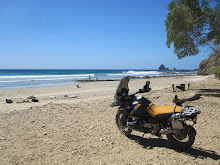Near the southern border of Ecuador I saw a bent yellow pipe about 7' in the air, stretching across the road. I shot underneath it and looked back towards Mark when I saw a few military personnel hop out of a little shack and wave me over. Aparently it was meant to be a road block but wasn't terribly effective. The soldiers were very friendly and inquisitive and also seemed somewhat worried about our travels to Peru which they said was very dangerous.
I assumed Peru would look like this: Lots of little Peruvians in native garb chewing coca leaves while swatting at alpacas with sticks, all in the high mountains. Some blow on wooden pipe things while others are knitting and everyone is smiling. I came to find out this wasn't the case exactly.
The border crossing into Peru was easy, just had to do some quick paperwork on the Ecuadorian side then ride over a bridge marking the international boundary. Inside the little customs office there were several men, two of which processed our paperwork. One man would read aloud our personal information while the other did a hunting and pecking procedure on the keyboard. We didn't know it at the time, but this would be very representative of the rest of our time here in Peru.
We left the checkpoint and started riding and instantly came aware of the fact that Peruvians love to put things in the road. There were signs requesting that people please not put rocks in the road as well as signs requesting that tires not be burned on the road. In addition, there were hundreds of goats, cows, donkeys, dogs, pigs and people running wildly on the asphault. The roads here are nice, though. They use cutting and filling to smooth the terrain unlike in Ecuador where the natural topography is rarely conquered.
We pulled over at the first sign of life that we saw, a little service station with a restaurant attached. We throught we'd try the beef as the cows on the road looked to be pretty healthy. Minutes later the cook brought our food, presenting it to us in a with a little bow which was probably meant to make us think we weren't eating rubbery hack-meat as that's exactly what it was. There were tons of bone fragments still hanging on to the piece via inedible strands which couldn't be cut with the knives provided. My pocket knife helped carve off a few edible pieces, the rest we threw to a pack of dogs who'd assembled nearby. Perhaps they know that when gringos stop by they will get a good meal.
The road soon flattened out and cut directly into a desert with tiny shacks placed sporadically next to the road and were built out of what woven mats, used like plywood and placed over a stick frame. The holes in the mats were huge, enough to let a bird in. Trash was everywhere. We didn't really have plans as to where to stop so we pulled off the highway into one of the first larger towns we came through. We rode about a quarter mile down their main street, turned around and rode off. Mark and I were both dry heaving in our helmets as the town couldn't have smelled much worse. The people gave us blank, unwelcoming stares. Just as we were about to get back on the main highway we had to ride through some sewage that was flowing across the street. Mark and I looked at each other and shook our heads.
The next town still smelled bad but we'd gotten used to it a little bit. Pieces of trash were more common than dry leaves on the ground. We asked several people where hotels were and usually got a shrug or a mutter and a hand wave off in the distance. We finally did find one, though, for about $3 US each. I could touch the walls with my head and toes at the same time. There was a small gap between our beds, just enough to walk through. A huge window opened up to a the street below that was never quiet.
Peruvians honk constantly. They honk when crossing an intersection, when behind cars, when passing cars, when getting passed, when oncomming cars are passed, when bikes are on the road, when people are on the sidewalk, etc. There is so much honking that the honk has lost quite a bit of respect, obviously. To combat this, the Peruvians have now incorporated car alarms into their horns. So instead of a honk, they make a loud electronic wailing sound. A few cars even had police sirens mounted. I can see exactly what's going to happen in the next 10 years...
While in town Mark and I frequently held down our horn for minutes at a time, even when stopped, which felt good. The horns aren't really a problem, though, it's the lack of respect from the drivers that is apalling. There are few stoplights or stopsigns so it's a total free-for-all. Cars will pull out in front of other cars, causing them to skid their tires all the time.
We unloaded everything and parked the bikes in a secure parking lot, put our covers on them and locked them together before stopping at a little restaurant for a some Peruvian pizza which was good. We then went found a moto-taxi (three wheeled tuk-tuk), whose driver,'Johnny', we asked to take us to a place where they had pisco sours, the famed drink of Peru. He brought us to a little place and I invited him to join us. They had no pisco but did have Cusqena, the national beer. We learned the Peruvian drinking technique of sharing one glass amongst a table, pouring a small amount for yourself, guzzling it, then shaking the foam out on the floor before passing the cup on to the nex person.
We had Johnny take us on a tour of the little city and he enjoyed sharing little bits of information with us. He needed some fuel, as he'd been driving us around for a while, so we offered to buy him some fuel. Johnny really liked this and asked me if I would like to drive his taxi. "Si, claro!" I said as I hopped on the 125cc beast. I kicked motor over and it fired up, burning my foot on the already hot engine. Steering wasn't exactly crisp, nor was braking but it was still fun to zip around the side streets. I drove for a while before Mark took over, who got us back to our hotel safely.
Sunday, March 21, 2010
Subscribe to:
Post Comments (Atom)


No comments:
Post a Comment